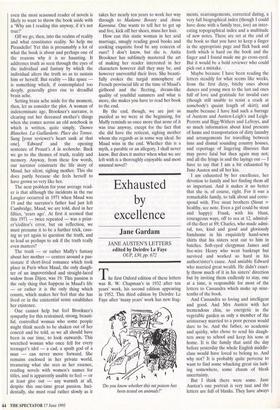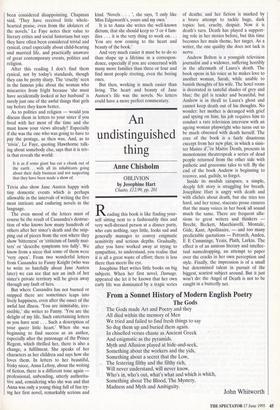Exhausted by excellence
Jane Gardam
JANE AUSTEN'S LETTERS edited by Deirdre Le Faye OUP, £30, pp. 672 The first Oxford edition of these letters was R. W. Chapman's in 1932 after ten years' work, his second edition appearing in 1952. This third edition by Deirdre Le Faye after 'many years' work has new frag- Do you know whether this rat poison has been tested on animals?' ments, rearrangements, corrected dating, a very full biographical index (though I could have done with a family tree, too) an inter- esting topographical index and a multitude of new notes. These are set at the end of the book so that you have to keep a finger in the appropriate page and flick back and forth which is hard on the book and the finger and I found made me go cross-eyed. But it would be a bold reviewer who could pick out a mistake.
Maybe because I have been reading the letters steadily for what seems like weeks, from the first dizzy, bitchy ones about dances and young men to the last sad ones full of love and gratitude for invalid care (though still unable to resist a crack at somebody's quaint length of skirt); and maybe because I have had such a barrage of Austens and Austen-Leigh's and Leigh- Perrots and Bigg-Withers and Lefroys, and so much information about kind presents of hams and transportation of dirty laundry and arrangements for travelling between inns and dismal sounding country houses, and reportage of lingering illnesses that may prove fatal but then again may not; and all the lyings in and the layings out — I have to say that I am a bit exhausted by Jane Austen and all her kin.
I am exhausted by her excellence, her devotion to family and her finding them all so important. And it makes it no better that she is, of course, right. For it was a remarkable family, to talk about and corre- spond with. Five stout brothers (Stout = healthy, see note. Even a girl could be stout and happy): Frank, with his blunt, courageous ways, off to sea at 12, admiral- of-the-fleet at 89; Charles, who made admi- ral, too, kind and good and gloriously handsome in his exquisitely hand-sewn shirts that his sisters sent out to him in batches. Soft-eyed clergyman James and live-wire Henry who went bankrupt but survived and worked so hard in his author/sister's cause. And amiable Edward who married great wealth. He didn't exact- ly throw much of it in his sisters' direction but by inviting them endlessly to stay, one at a time, is responsible for most of the letters to Cassandra which make up nine- tenths of the book.
And Cassandra so loving and intelligent and good. And Mrs Austen with her tremendous chin, so energetic in the vegetable garden as only a member of the aristocracy married to a poor person would dare to be. And the father, so academic and quirky, who chose to send his daugh- ters away to school and keep his sons at home. It is the family that until the day before yesterday the whole English middle- class would have loved to belong to. And why not? It is probably quite perverse to want to find some whacking great sin lurk- ing somewhere, some chasm of bleak uncertainty. But I think there were some. Jane Austen's one portrait is very taut and the letters are full of blanks. They have always been considered disappointing. Chapman said, 'They have received little whole- hearted praise, even from the idolaters of the novels.' Le Faye notes their value to literary critics and social historians but says they have often been considered trivial and cynical, cruel especially about child-bearing and married life, and practically unaware of great contemporary events, politics and religion.
After this reading I don't find them cynical, not by today's standards, though they can be pretty sharp. The 'cruelty' seen in the famous joke about the woman who miscarries from fright because 'she must have accidentally looked at her husband' is surely just one of the awful things that girls say before they know better.
As to politics and religion — would you discuss them in letters to your sister if you lived with her most of the time and she must know your views already? Especially if she was the one who was going to have to pay the postage, as then was. And, as to 'trivia', Le Faye, quoting Hawthorne talk- ing about somebody else, says that it is triv- ia that reveals the world:
It is as if some giant has cut a chunk out of the earth . . . with all its inhabitants going about their daily business and not suspecting that they have been made a show of.
Trivia also show Jane Austen happy with tiny domestic events which is perhaps allowable in the intervals of writing the five most intricate and enduring novels in the language.
The even mood of the letters must of course be the result of Cassandra's destruc- tion of who knows how many hundreds of others after her sister's death and the snip- ping out of pieces from the rest where they show 'bitterness' or 'criticism of family mat- ters' or 'describe symptoms too fully'. We know from a niece that some of them were 'very open'. From two wonderful letters from Cassandra to Fanny Knight (who was to write so hatefully about Jane Austen later) we can see that not an inch of her sister's private territory will be given away through any fault of hers.
But where Cassandra has not burned or snipped there are sometimes leaps into lively happiness, even after the onset of the awful last illness. 'You are inimitable, irre- sistible,' she writes to Fanny. 'You are the delight of my life. Such entertaining letters as you have sent . . . Such a description of your queer little heart.' When she was beginning to find success as an author, especially after the patronage of the Prince Regent, which thrilled her, there is also a change, a fulfilment. She speaks of her characters as her children and says how she loves them. In letters to her beautiful, frisky niece, Anna Lefroy, about the writing of fiction, there is a different tone again professional, unbending, utterly authorita- tive and, considering who she was and that Anna was only a young thing full of fun try- ing her first novel, remarkably serious and kind. 'Novels . . . ', she says, 'I only like Miss Edgeworth's, yours and my own.'
It is to Anna she writes the well-known dictum, that she should keep to '3 or 4 fam- ilies . . . it is the very thing to work on.. . You are now coming to the heart and beauty of the book.'
And very much easier it must be to do so than shape up a lifetime in a correspon- dence, especially if you are concerned with many more families than three or four and find most people riveting, even the boring ones.
But then, working is much easier than living. The heart and beauty of Jane Austen's life was the novels. No letters could have a more perfect commentary.



































































 Previous page
Previous page